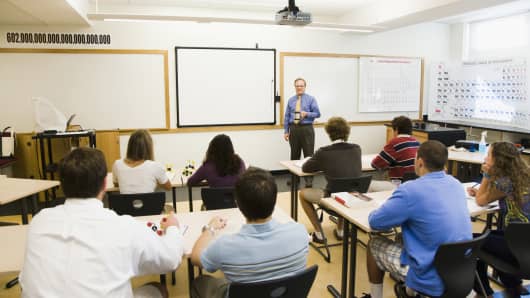Business leaders understand the urgency of this better than anyone, and we recognize the world is changing – fast. Low-skill jobs that pay well are disappearing and never coming back. What used to be elite knowledge is now entry-level knowledge.
(Read More: Harvard President: Zuckerberg Dropped Out, but His Staff Didn't)
Other countries are making the education of their workforces a priority. Yet, while the United States still has one of the best educated workforces, we are the only industrialized country where the generation just entering the labor market is less likely to have a college degree than the one about to leave the labor market.
The percentage of youth in America is declining, while the population is growing more diverse. And while the latter trend presents tremendous opportunities, the dropout rate for Latino and African American students in the U.S. remains 20 points higher – almost 50 percent -- compared to the overall U.S. school population.
These students, who have been underserved by our education system will become a massive portion of our future workforce. So ensuring access to high-quality education for all students is not just the right thing to do. It's also the smart thing.
(Read More: Is the Four-Year, Liberal-Arts Education Model Dead?)
Changing how we educate is as important for the individual worker as it is to the strength of the workforce as a whole.
More than ever, the success of American workers—their income, employment, financial and career stability—are all determined by one simple factor: how well their education matches up with the economic demands of the world. Nothing illustrates this better than the fact that there were 3.7 million unfilled jobs on the last business day of November 2012 despite an unemployment rate that has failed to return to prerecession levels.
Education has always been—and can still be—the key to fulfilling the American Dream. And business depends on education to produce the skilled, innovative, first-class individuals we need to keep America a global leader. But like any system, we should make improvements to optimize it to meet the challenges of today and those we will face tomorrow.
The good news is that there are thoughtful policy solutions that are already having a positive effect at the local, state and federal levels.
(Read More: Is an Ivy League Education Really Worth It?)
World class academic standards are helping ensure that every single student is held to the same high expectations—and given the solid educational foundation—they need to succeed in both school and career. We now look beyond just aggregate and average figures; we also look at subgroups of students, like English Language Learners, who may need more support to reach higher standards. We are accurately reporting graduation rates. And we are bringing renewed priority to improving our nation's lowest performing schools.
In addition, some of the biggest names in business, from General Electric to ExxonMobil and Wells Fargo, are strengthening their commitment to improving education and ensuring all U.S. students succeed academically and professionally. Many of us are extending that commitment to helping improve America's education system even further. This April, I will be joining a number of my fellow CEOs to discuss the ways in which we—as business leaders—can help ensure our country is not just aware of the urgency but is implementing the solutions.
Governor Terry Branstad remarked in Iowa's State of the State address that college and career-readiness upon high school graduation is "an economic and moral imperative." He's right of course. America's success has long been defined by its ability to innovate, adapt and excel. It's time to apply that thinking to our education system.
(Read More: America's Most Offbeat College Scholarships)
Edward B. Rust Jr. is Chairman and CEO of State Farm Mutual, Chairman of the U.S. Chamber of Commerce, and co-chair of the Business Coalition for Student Achievement. On April 15 and 16, Rust will join business and policy leaders in Washington D.C. at "UPGRADE AMERICA 2013," an event that will bring great business minds together to improve education and the workforce of tomorrow.


